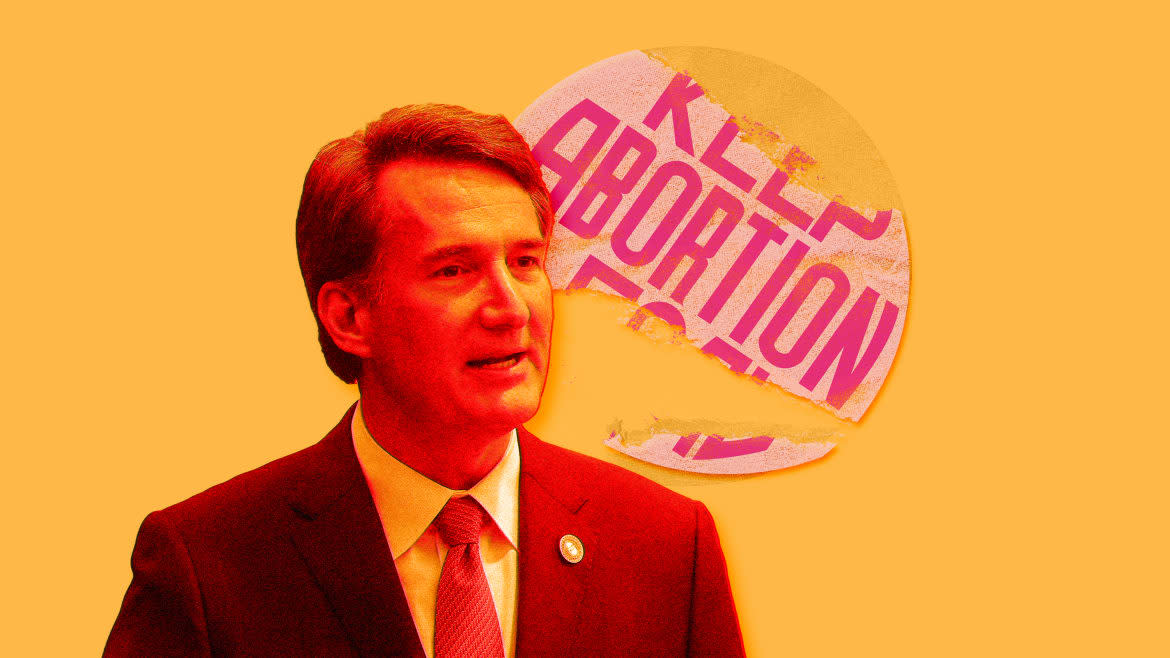Virginia Gov. Glenn Youngkin’s Political Future Hinges on Banning Abortion

- Oops!Something went wrong.Please try again later.
Gov. Glenn Youngkin’s name is not on the ballot, but his political future is in the hands of Virginia voters in November. The state’s off-year election will once again signal the power of the abortion issue in the aftermath of the Supreme Court overturning Roe v. Wade, while also testing Youngkin’s brand of congenial conservatism in the post-Roe climate.
The looming question: If he can’t win over Virginia voters, how could he be a credible 2024 presidential candidate?
Youngkin is running hard to deliver Republican majorities in the Virginia House of Delegates and Senate that could then tee up the legislation to make good on his promise to sign a 15-week abortion ban.
Glenn Youngkin’s MAGA-Lite Image Isn’t Going to Win Over the GOP
Fox News media mogul Rupert Murdoch is urging Youngkin to enter the race, courting him in at least two face-to-face meetings, The Washington Post reported. Youngkin is open to the idea of running, but won’t decide until he sees how his party fares in the November election.
Democrats have a two-seat margin in the state Senate, enough to easily stymie Youngkin’s agenda. Republicans, for their part, control the state House with a two-seat margin after flipping seven seats two years ago on Youngkin’s coattails.
Term limited to a single four years, Youngkin needs to hold the House and bring in a GOP-controlled Senate that would allow him to “happily and gleefully” (his words) sign any legislation that “restricts abortion and protects life.”
“It’s a down to the wire environment in Virginia,” says Stephen Farnsworth, a political scientist who heads the Center for Leadership and Media Studies at Mary Washington University. Virginia elections are decided in the suburbs, where Youngkin’s push for a 15-week ban will be tested. “Any Democratic candidate who’s not talking about abortion is committing political malpractice,” says Farnsworth. “Anywhere it’s put before the public, it’s bad news for Republicans.”
Democrats are bullish about their chances to win majorities in both houses, largely on the strength of the abortion issue. “This has gone from a theoretical threat to a clear and present danger that played out in 2022 (in the midterm elections) and is playing out again in 2023,” says Jesse Ferguson, a Virginia-based Democratic consultant.
Kareem Abdul-Jabbar: GOP Debate Showed How Not to Pick a President
Democratic Caucus Chair Mamie Locke, a member of the Virginia Senate since 2004, did the math for The Daily Beast: Democrats have 22 seats; Republicans have 18.
“We are taking comfort that in all likelihood we can get to 21, probably 22, and maybe 23.” Democrats won a special election in January, a seat that was held by a Republican for 20 years. “Abortion was a major topic of discussion when you knock on doors,” says Locke.
A poll asked voters which they preferred–current law that aligns with Roe or a 15-week abortion ban–significant majority cited current law. “A ban is a ban,” says Locke. “Voters don’t see that as a moderate position.”
Virginia is the only Southern state that has not passed a ban or heavy restrictions on abortion in the aftermath of the Supreme Court overturning Roe. It has not been for lack of trying.
The Right Needs to Ask: ‘Why Do These Racists Keep Getting Hired by Us?’
In the last legislative session early this year, Republicans held committee hearings on three anti-abortion bills, including a 15-week ban backed by Youngkin with exceptions for rape and incest, and for the mother’s life. All were blocked by the Democratic-controlled Senate.
That dynamic would change in an instant if Youngkin and his party are successful.
Republicans are trying to sidestep the wild card issue of abortion in the dozen or so House races and handful of competitive Senate seats that will decide the election. The Washington Post published secret recordings of a Republican candidate campaigning for the House of Delegates on crime and kitchen table economic issues, while privately assuring voters he’s a practicing Catholic and supports a total ban.
The message is clear: If Youngkin can’t deliver a legislature that can ban abortion, he strikes out as a presidential candidate, at least for now.
Given the one-term limit, Youngkin also faces an unforgiving calendar. “You can’t play if you haven’t suited up,” says Farnsworth, pointing out that Democratic control of the Senate stymied Youngkin’s agenda for his first two years. Also, it’s not clear that Republican primary voters are looking for an alternative to Trump.
Nikki Haley Is Starting to Look Like a Real Threat to Trump
“Youngkin is just the next DeSantis—overhyped, appeals to donors and media, but zero reason to believe he has popular appeal,” is how a Democratic strategist in an email brutally summed up Youngkin—a wealthy private equity investor who captured media attention with his red vest and early appeals for parental rights.
“Fox [News] can be pretty persuasive, but this is not the right time for Youngkin,” says Farnsworth, who thinks he would have a better chance sitting out this one and waiting until 2028. “He’s not a glib media voice who can propel himself from zero to 10 overnight. If he were on that debate stage (last week in Milwaukee), he would have gotten as much airtime as [former Arkansas Gov. Asa] Hutchinson and been as visible as [North Dakota] Gov. Doug Burgum.”
It’s up to Virginia voters to give Youngkin a ticket to ride in the GOP primary race, and that’s tricky in a state that’s not as red as Republicans hoped, and not as blue as Democrats thought.
Get the Daily Beast's biggest scoops and scandals delivered right to your inbox. Sign up now.
Stay informed and gain unlimited access to the Daily Beast's unmatched reporting. Subscribe now.

